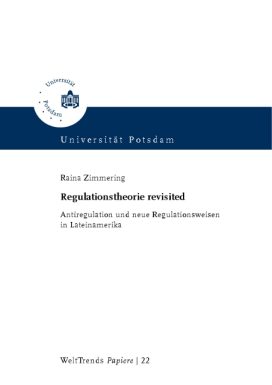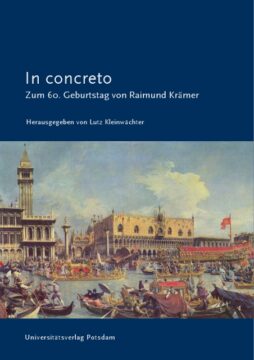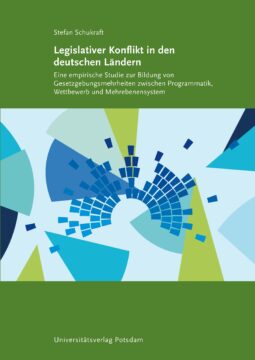By building on new approaches to regulation theory, that emerged in the late 1970s and explained the functioning of capitalist structures and processes through accumulation regimes, regulation, and crisis, the author critically questions the classical approach as well as its adaptation to various other social science theory approaches, such as the neo-Gramscian. From the perspective of development research and by considering different examples of contemporary processes of social transformation and emancipatory experiments in Latin America, the author points out that regulation theory remains a valuable basis for analysing contemporary capitalism; however, a shift of emphasis is necessary.
Antiregulation und neue Regulationsweisen in Lateinamerika
ISBN: 978-3-86956-211-7
31 pages
Release year 2013
Series: WeltTrends - Papiere , 22
6,00 €
Non-taxable transaction according to § 1 (1) UStG/VAT Act in combination with § 2 (3) UStG/VAT Act a. F. Providing this service, the University of Potsdam does not constitute a Betrieb gewerblicher Art/Commercial Institution according to § 1 (1) No. 6 or § 4 KStG/Corporate Tax Act. If the legal characterization of our business is changed to a commercial institution subsequently, we reserve the right to invoice VAT additionally. zzgl. Versandkosten
By building on new approaches to regulation theory, that emerged in the late 1970s and explained the functioning of capitalist structures and processes through accumulation regimes, regulation, and crisis, the author critically questions the classical approach as well as its adaptation to various other social science theory approaches, such as the neo-Gramscian. From the perspective of development research and by considering different examples of contemporary processes of social transformation and emancipatory experiments in Latin America, the author points out that regulation theory remains a valuable basis for analysing contemporary capitalism; however, a shift of emphasis is necessary.
Recommended Books
-
 2010
2010Der Konflikt um Wasser in Israel und Palästina
12,00 €Non-taxable transaction according to § 1 (1) UStG/VAT Act in combination with § 2 (3) UStG/VAT Act a. F. Providing this service, the University of Potsdam does not constitute a Betrieb gewerblicher Art/Commercial Institution according to § 1 (1) No. 6 or § 4 KStG/Corporate Tax Act. If the legal characterization of our business is changed to a commercial institution subsequently, we reserve the right to invoice VAT additionally.
zzgl. Versandkosten
Add to cart -
 2012
2012In concreto
6,00 €Non-taxable transaction according to § 1 (1) UStG/VAT Act in combination with § 2 (3) UStG/VAT Act a. F. Providing this service, the University of Potsdam does not constitute a Betrieb gewerblicher Art/Commercial Institution according to § 1 (1) No. 6 or § 4 KStG/Corporate Tax Act. If the legal characterization of our business is changed to a commercial institution subsequently, we reserve the right to invoice VAT additionally.
zzgl. Versandkosten
Add to cart -
 2019
2019Legislativer Konflikt in den deutschen Ländern
28,00 €Non-taxable transaction according to § 1 (1) UStG/VAT Act in combination with § 2 (3) UStG/VAT Act a. F. Providing this service, the University of Potsdam does not constitute a Betrieb gewerblicher Art/Commercial Institution according to § 1 (1) No. 6 or § 4 KStG/Corporate Tax Act. If the legal characterization of our business is changed to a commercial institution subsequently, we reserve the right to invoice VAT additionally.
zzgl. Versandkosten
Add to cart -
 2009
2009Die Politik Deutschlands in der Kosovofrage
6,00 €Non-taxable transaction according to § 1 (1) UStG/VAT Act in combination with § 2 (3) UStG/VAT Act a. F. Providing this service, the University of Potsdam does not constitute a Betrieb gewerblicher Art/Commercial Institution according to § 1 (1) No. 6 or § 4 KStG/Corporate Tax Act. If the legal characterization of our business is changed to a commercial institution subsequently, we reserve the right to invoice VAT additionally.
zzgl. Versandkosten
Add to cart
Contact
Potsdam University Library
University Press
Am Neuen Palais 10
14476 Potsdam
Germany
verlag@uni-potsdam.de
0331 977-2094
0331 977-2292





